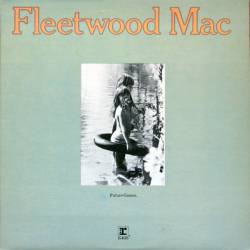Recorded at Advision.
Danny Kirwan-Guitar and vocals
Joined Fleetwood Mac 1968 from Boilerhouse, ex Brixton Blues band.
Christine McVie-Piano and vocals
Joined Fleetwood Mac in the Summer 1970, from Chicken Shack.
Bob Welch-Guitar and vocals
Joined Fleetwood Mac in Spring 1971 from various California R&B groups.
Mick Fleetwood-Drums
Original member of the group with Peter Green, 1967. From John Mayall's Bluesbreakers, and Shotgun Express with Rod Stewart, to name a few.
John McVie-Bass
Founder-member of John Mayall's Bluesbreakers. From 1963 to 1967. Joined Fleetwood Mac from its inception.
Fleetwood Mac Personnel changes to date:
Mick Fleetwood, Jeremy Spencer, John McVie and Peter Green started group in 1967. Danny Kirwan joined later. Then Peter Green left in 1969. And then Christine McVie joined. Then Jeremy left six months later. Bob Welch joined in 1971.
CD Reissue Liner Notes:
After a series of personnel changes that saw the departure of two of the group's founding members, Fleetwood Mac rebounded with one of the most significant and satisfying albums of their career. Released in late 1971, Future Games was a breathtaking musical pastiche that heavily featured the musical contributions of the band's two newest members, American Bob Welch and Christine McVie, wife of bassist John McVie and an essential component to the group's new sound.
Fleetwood Mac was formed in 1967 when McVie, drummer Mick Fleetwood and guitarist Peter Green left John Mayall's legendary Bluesbreakers to form their own band. Recruiting Elmore James enthusiast Jeremy Spencer, the group played its first gig in August of that year at the British Jazz and Blues Festival and immediately landed a recording contract. Fleetwood Mac's self-titled debut was released later that year and was an immediate best-seller, yielding the hit single 'Black Magic Woman.'
It was followed by a series of popular and critically acclaimed releases, showcasing not only the band's consummate blues abilities, but their wide-ranging grasp of a variety of musical styles. On albums such as Mr. Wonderful (1969), Then Play On (1969) and Kiln House (1970), Fleetwood Mac set standards for taut, economical ensemble work as well as dazzling guitar virtuosity and supple songwriting skills.
These LPs also mirrored the band's rapidly shifting line-up. Founding member Peter Green left the group in 1970, followed a year later by Jeremy Spencer. Danny Kirwan, who had joined the group in time to record their second album, was augmented by keyboardist/vocalist Christine Perfect, formerly of the British blues/rock outfit Chicken Shack. Bob Welch, a Los Angeles-based guitarist and vocalist who had served a stint in an R&B band called the Seven Souls, was recruited as a replacement for Spencer.
It was this line-up - Christine and John McVie, Bob Welch, Danny Kirwan and Mick Fleetwood - that entered the studio in the summer of 1971 to record Future Games. The album's tune stack ranges from the Bob Welch R&B shouter 'Lay It All Down,' to the evocative, jazz-flavored title track to the lilting Christine McVie ballad 'Show Me A Smile.' The three Kirwan-penned tunes are special treats. According to one critic, 'Woman Of 1000 Years' 'floated on a languid sea of echo-laden acoustic and electric guitars,' while 'Sometimes' boasted a sparkling country arrangement and 'Sands Of Time' accented the band's formidable melodic prowess.
(C) (P) 1971 Warner Bros. Records Inc.Reprise Records, a division of Warner Bros. Records Inc., a Warner Communications Company.
All Rights Reserved. Unauthorized duplication is a violation of applicable laws.
Mfg. by WEA Manufacturing.
Printed in U.S.A.
WARNING: The music on this Compact Digital Disc was originally recorded on analog equipment, prior to modern noise reduction techniques. This Compact Disc preserves, as closely as possible, the sound of the original recording, but it’s high resolution also reveals limitations in the master tape, including noise and other distortions.
The Compact Disc Digital Audio System offers the best possible sound reproduction - on a small, convenient disc. Its remarkable performance is the result of a unique combination of digital storage and laser optics.
For best results, you should apply the same care in storing and handling the Compact Disc as you would with conventional records. No cleaning is necessary if the Compact Disc is always held by its edges and is replaced in its case directly after playing. If the Compact Disc becomes soiled by fingerprints, dust or dirt, it can be wiped (always in a stright line, from center to edge) with a clean and lint-free, soft, dry cloth. Never use a solvent or abrasive cleaner to clean the disc. If you follow these suggestions, the Compact Disc will provide a lifetime of listening enjoyment.
0 7599-27458-2 6

Comments are closed.